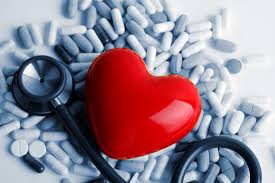
Diagnosed with Cancer? Your two greatest challenges are understanding cancer and understanding possible side effects from chemo and radiation. Knowledge is Power!
Learn about conventional, complementary, and integrative therapies.
Dealing with treatment side effects? Learn about evidence-based therapies to alleviate your symptoms.
Click the orange button to the right to learn more.
- You are here:
- Home »
- Blog »
- side effects ID and prevention »
- Heart Disease Second Malignancy-1st 2nd Cause of Death!
Heart Disease Second Malignancy-1st 2nd Cause of Death!

“Of those (cancer) survivors, heart disease is the second leading cause of death. The first leading cause of death is second malignancy…”
If you are a cancer survivor, you may need a cardio-oncologist on your team. According to the article linked below, the leading cause of death for cancer survivors is a treatment-induced secondary cancer and the second leading cause of death for cancer survivors is therapy-induced heart disease.
I’m a cancer survivor. I was diagnosed with chemotherapy-induced cardiomyopathy about 15 years after my autologous stem cell transplant. Further, my risk of treatment-related secondary cancer is high and increasing annually. These two side effects of my cancer treatments in ’95 and ’96 are the 1st and 2nd leading causes of death among cancer survivors like me.
What are the most common late stage side effects for cancer survivors?
- Fatigue: Persistent tiredness and lack of energy are common among cancer survivors, even long after treatment has ended.
- Pain: Chronic pain can be a late-stage side effect, especially for survivors who underwent surgery, radiation therapy, or chemotherapy.
- Neuropathy: Nerve damage caused by chemotherapy or radiation therapy can lead to numbness, tingling, or weakness in the hands and feet.
- Cognitive difficulties: Often referred to as “chemo brain,” some cancer survivors experience problems with memory, concentration, and multitasking.
- Lymphedema: Swelling in the arms or legs can occur if lymph nodes were removed or damaged during cancer treatment.
- Cardiovascular problems: Certain cancer treatments, such as radiation therapy and some chemotherapy drugs, can increase the risk of heart problems later in life.
- Bone health issues: Cancer survivors may be at increased risk of osteoporosis or bone fractures due to the effects of chemotherapy, hormonal therapies, or other treatments.
- Emotional and psychological effects: Anxiety, depression, post-traumatic stress disorder (PTSD), and other mental health issues can arise during or after cancer treatment.
- Hormonal imbalances: Some cancer treatments can disrupt hormone levels in the body, leading to issues such as infertility, sexual dysfunction, or early menopause.
- Secondary cancers: While less common, some cancer survivors may develop new cancers later in life, either as a result of previous treatment or due to shared risk factors.
If you are a newly diagnosed cancer patient about to undergo treatment or you cancer survivor yourself, what do you do? Research is limited but consider evidence-based non-conventional therapies shown to
- Reduce your risk of cancer and
- Make your heart stronger
This may sound odd but what I’m saying is, even if you have not been diagnosed with either of the two long-term side effects discussed below, act as if you have. Meaning lead an anti-cancer lifestyle and lead a heart healthy lifestyle- both via nutrition, supplementation and lifestyle therapies.
If you would like to learn more about evidence-based but non-conventional therapies send me an email at David.PeopleBeatingCancer@gmail.com
Hang in there,
David Emerson
- Cancer Survivor
- Cancer Coach
- Director PeopleBeatingCancer
The Cardio-Oncologist Will See You Now
“There are more than 15 million cancer survivors in the United States, expected to exceed 20 million by 2026. Of those survivors, heart disease is the second leading cause of death. The first leading cause of death is second malignancy.
As the numbers of survivors grow, so too does the number of patients living with late effects of cancer-related cardiotoxicity. For example, among Hodgkin lymphoma patients who have received radiation, cardiovascular disease is a major cause of death.
Over the last two decades, awareness that cancer care can directly result in cardiac complications is growing, as is the understanding that patients who have survived cancer have an increased risk of dying from heart failure, coronary heart disease and stroke. This has led to an increase in interest in the field of cardio-oncology.
Cardio-oncology specialists treat those with cancer who also have cardiovascular disease either before or as a result of cancer treatment. They also focus on preventing potential heart problems that may occur as a result of cancer diagnosis or as a side effect of therapies, or treat these cardiac problems as they arise…
Although cardio-oncology’s roots stretch back as far as the 1960s, and despite the fact that it is recognized medical specialty, only a handful of training programs in this field exist in the United States. The Accreditation Council for Graduate Medical Education does not endorse any structured training format.
Cardiac care is not likely the first thing on a patient’s mind when facing a diagnosis of cancer. However, increasing evidence of the link between cancer and cardiovascular disease led to the development of the first paper on cardio-oncology in the 1990s; and eventually, the first onco-cardiology program at MD Anderson in 2000.
The purpose of this subspecialty is to diagnose, prevent and treat cancer therapy–induced cardiac toxicity. Since the field’s formal origin in 2000, many centers, such as the Rush University Medical Center, the Moffitt Cancer Center and Vanderbilt University,have employed cardio-oncologists…
Cardio-oncology has been a topic of discussion and research at national scientific forums such as the 2019 American Heart Association conference. The American College of Cardiology convened the first cardio-oncology intensive conference at the ACC national meeting in 2015, and has since held a national cardio-oncology course every February.
Nonetheless, many institutions do not have a cardio-oncologist on staff. Centers that offer cardio-oncology services roughly doubled from 2014 to 2018. However, these findings were based on responses from only 39 percent of programs surveyed; and according to the Journal of the American College of Cardiology, fewer than 50 percent of the cardiovascular training programs include cardio-oncology topics in their curriculum.
Recognizing the importance of this unique specialty, governing cardiology organizations such as the ACC developed a cardio-oncology council in 2014. The American Heart Association followed suit and instituted a cardio-oncology committee in 2019…
Despite its importance and history, this field is still expanding slowly. In 2015, a survey sent by the ACC cardio-oncology council to cardiology program directors and chairs reported that 27 percent of centers have dedicated cardio-oncology programs.
Over 70 percent of those who responded agreed that cardiovascular complications are a major issue that faces cancer patients. Over 50 percent reported that cardio-oncology programs improve patient care. But only 12 percent were planning on adding the services into their programs within the year…
As the aging patient population of cancer survivors grows, the National Cancer Institute, the American Society for Clinical Oncology and others have developed survivorship models and guidelines to ensure screening and monitoring for potential late side effects. The American College of Cardiologyoffers resources on side effects that occur during or immediately after cancer treatment.
Yet many patients’ cardiac side effects of cancer therapy go undetected for years or even decades after cancer treatment has ended. In our cardio-oncology clinic at Rush, several patients present with heart failure, heart rhythm issues, heart valve disorders, coronary blockage and heart attacks, mostly as a result of earlier cancer therapies…


